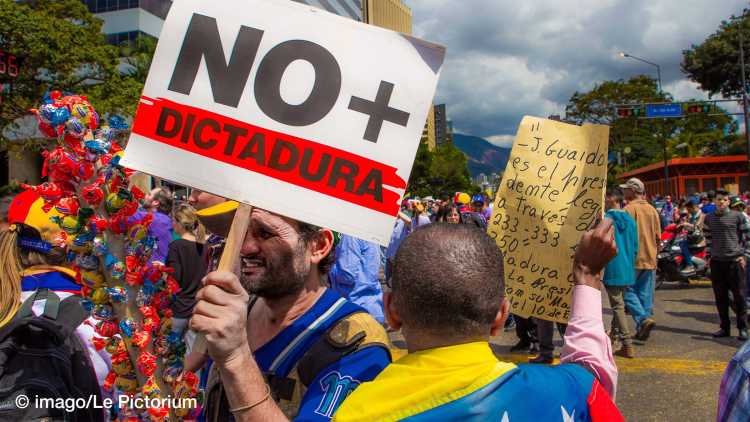- Startseite
- Publikationen
- GIGA Focus
- Chile’s Constitutional Reform Process Rebooted
GIGA Focus Lateinamerika
Chile’s Constitutional Reform Process Rebooted
Nummer 4 | 2022 | ISSN: 1862-3573

Almost two years after about 80 per cent of Chileans voted for comprehensive constitutional reform and the election of a Constitutional Convention, the new draft constitution was roundly rejected by the voters in a 4 September referendum. Since the majority of those who rejected the proposal are in favour of a new constitution, the constitution-making process will continue, with many unanswered questions going forward.
The reasons for the rejection of the constitution are manifold: they lie in the performance of the Constitutional Convention, the quality of the draft, a misjudgement of the political constellation of forces and the interests of the citizens, and changing political and economic conditions since the beginning of the constitution-making process.
Even a participatory constitutional process that has been exemplary from a democratic and constitutional perspective can fail. Constitutional poetry may warm the hearts of core supporters but is insufficient to persuade those living in prosaic circumstances. The Constitutional Convention, with its large number of independents and political newcomers, did not live up to expectations. Political parties and Congress will end up playing a crucial role in the next round of constitution-making.
Even the supporters of the proposed constitution recognised its shortcomings before the referendum, and most of the opponents also want a new constitution. The dissatisfaction on both sides with the status quo and the reform process could be the basis for a consensus on the core elements of a new constitution and the procedure leading to it. But there is also the risk that the hubris of the left majority in the Constitutional Convention will be replaced by the hubris of the right in the wake of this draft’s rejection.
Policy Implications
The political elite must decide as quickly as possible how to proceed in the constitution-making process. Otherwise, there is a risk of renewed social unrest and of further loss of confidence in political institutions. The positive scenario would be the drafting of a constitution that retains as many of the progressive innovations as possible but also accommodates the main concerns of the opponents of the rejected proposal.
A Resounding Result
The referendum on a new constitution on 4 September has once again brought Chile into the focus of the international press. While ahead of the referendum Chilean president Gabriel Boric graced the cover of Time magazine (September 2022), which dedicated a long article to him and the new constitution, the editorial board of the The Washington Post (2022) opined, “Chile should send its proposed constitution back for a rewrite.”
Although most Chileans do not read the The Washington Post, its proposal won the day. With a record turnout of 86 per cent – voting was compulsory – 62 per cent of Chileans voted against the new constitution and only 38 per cent in favour. What is surprising is not the draft constitution’s rejection – which all opinion polls had predicted – but the margin by which it was rejected. All regions, including the metropolitan area of Santiago (with 55 versus 45 per cent), voted against the proposed constitution. In only 8 of 346 municipalities did the voters approve of it. The rejection rate was higher in poor and lower-middle-class municipalities than in more prosperous communities.
Overcoming the Pinochet Constitution
Demands to replace the 1980 Chilean constitution had been made since its adoption. It was drawn up under the despotic regime of Augusto Pinochet without democratic participation with the objective of safeguarding the interests of the regime and its supporters and conferring upon it a façade of legitimacy. The constitution was intended to shield the neoliberal reforms beyond Pinochet and in the event of a future democratisation process. The constitution was approved in a referendum without democratic guarantees, coming into full force only after a transitional period of eight years.
Therefore, it is not surprising that the legitimacy of the constitution was questioned from the outset by the democratic opposition. Nolens volens, however, the opposition had to accept the rules of the constitution to initiate a democratic transition. By following the rules laid down by the regime, one could derive a de facto legitimisation of the constitution. Initial major reforms totalling 54 modifications were made to the constitution in 1989 before the transition to a democratic government.
The Chilean constitution of 1980 was not set in stone. Since the return to democracy in 1990, it has been reformed around 60 times, ten times alone to enable the adoption of a new constitution and to regulate the election and work of the Constitutional Convention. Most of the authoritarian elements have been eliminated. The last major reform took place in 2005 under President Ricardo Lagos (with 58 modifications); further smaller reforms were to follow, the latest occurring on 23 August 2022, which lowered the qualified majority needed for constitutional reforms from two-thirds to four-sevenths in both houses of Congress.
While the overtly authoritarian elements of the constitution were abolished, many elements remained that made sweeping economic and social reforms more difficult to achieve due to the prescribed majorities.
During Michelle Bachelet’s second presidency (2014–2018), a broad participatory process to draft a new constitution was initiated. Shortly before the end of her term, the draft constitution was presented, but it was not further discussed under the successor government of Sebastián Piñera (2018–2022).
An Exemplary Process of Constitution-Making
The constitutional process was a response to the violent social protests that began in October 2019. These eventually led to an agreement on 15 November 2019 – the so-called Agreement for Social Peace and the New Constitution – signed by party leaders across the ideological spectrum (also by future president Boric as an independent) to hold a referendum on whether a new constitution should be drafted, on the one hand, and on the mode of constitution-making, on the other.
The constitutional process in Chile has been hailed as exemplary: a “new model of democratic constitution making in a region with few desirable blueprints to follow” (Negretto 2021: 356). The drafting of the new text was bound by pre-existing rules (defined by a political agreement between the main political forces and guaranteed by constitutional amendments to the current constitution), inclusive mechanisms of representation and decision-making (by drafting the constitution by a convention directly elected by the citizens with inclusive electoral rules), and direct citizen involvement (Negretto 2021).
On 25 October 2020, 78 per cent of Chileans participating in the referendum voted in favour of a new constitution, and 79 per cent supported a Constitutional Convention of elected citizens to write it, rather than a mixed Constitutional Convention, half of which would have comprised members of Congress and the other half specially elected representatives. One should mention that in the three wealthiest communes of Santiago, the proposal for a new constitution was rejected. On average, voters who rejected the proposal were ideologically further right than the rest of the population (Meléndez, Kaltwasser, and Sajuria 2021).
In the elections for the Constitutional Convention on 15 and 16 May 2021, participation was low, at 43.4 per cent (compared to 50.9 per cent in the previous referendum). The elections resulted in a very pluralistic Constitutional Convention. Chile’s traditional parties saw their representation reduced, and many independent candidates were elected. They won 88 seats (Le Foulon and Palanza 2021). No group reached the one-third share needed to block (the constitution had to be approved by two-thirds of the Convention). The Constitutional Convention was gender-balanced (78 men and 77 women), and 17 seats were reserved for Indigenous candidates. Of the 155 elected members of the Constitutional Convention, only 34 (22 per cent) had previously run for elected office, and even fewer (20, or 12.9 per cent) had held an elected office (Piscopo and Siavelis 2021).
Something Went Wrong
When asked in August 2021, shortly after the Constitutional Convention started its work, whether they believe that the new constitution that may result from this process will probably help to solve Chile’s problems, have no effect, or likely worsen the current situation in the country, 49 per cent of Chileans had a positive view and only 15 per cent had a negative view (30 per cent thought things would remain the same). Nine months later (in a poll conducted in April and May 2022) the proportion of those optimistic had declined to 36 per cent (CEP 2022).
At the end January 2022, a clear majority (56 per cent) of Chileans declared they would approve of the new constitution in a referendum; a third (33 per cent) said they would disapprove of it. But support gradually dwindled during the Chilean summer, and in April there was, for the first time, a majority in favour of rejecting the new constitution, which subsequently stabilised (CADEM 2022). When President Boric received the draft of the new constitution on 4 July, in an opinion poll conducted in the same week (July 8; CADEM 2022) 53 per cent said that they would vote to reject, compared to 35 per cent who would vote to accept it. At that moment, the new constitution elicited much more fear and concern (61 per cent) than hope (35 per cent).
Dissatisfaction with the new constitution can have different reasons, those related to the content of the constitution and those related to the work and performance of the Constitutional Convention. When asked why they would reject the new constitution, in an opinion poll conducted in April and May (CEP 2022) 31 per cent (first mention) and 28 per cent (second mention) said because of the characteristics of the members of the Constitutional Convention and their performance. In May, in another opinion poll, only 22 per cent positively evaluated the level of inclusion of citizens in the drafting of the new constitution (Espacio Público – Ipsos 2022b). In July, only 40 per cent believed that the composition of the Constitutional Convention well reflected the diversity of Chilean society; 59 per cent took the opposite position. In the same opinion poll, only 30 per cent had trust in the Constitutional Convention compared to 51 per cent in August 2021 (Espacio Público – Ipsos 2022a). Yet, although trust in the Constitutional Convention had fallen drastically, it was still higher than trust in Congress (19 per cent) and in the political parties (7 per cent).
An Innovative and Progressive Proposal
The draft for a new Chilean constitution was innovative in many respects. It went beyond the constitutions of the so-called “new constitutionalism”: the break of this draft with Chile’s constitutional tradition would have been much more radical than that of the 1980 Pinochet constitution with its respective predecessors. The Senate would have been replaced by a Chamber of Regions. Decentralisation promoted by the new constitution contrasted with Chile’s centralist tradition. The judicial system would have been reformed, and the strong position of the Supreme Court would have been weakened.
According to the draft, Chile would become a social and democratic state of law, plurinational, intercultural, regional, and ecological. The Chilean democracy would be inclusive, with gender parity, far-reaching rights for Indigenous people, the LGBTQ+ community, and people with disabilities.
With 388 articles the text of the draft constitution was very long. Many things could have been expressed more briefly and concisely. In parts, the proposal resembles more of a political manifesto than a constitution. Some members of the Constitutional Convention seem to have wished to see their areas of interest or issues related to their identity mentioned as much as possible in the constitution.
Some analysts see the excess of vanguardism, post-modernism, and academia in the discussions of the Constitutional Convention as alienating large sectors of the population (Espina 2022). Other commentators point to the identity-political components of the document:
The Constitutional Convention, whose only mandate was to produce a text that would attract the majority of the country […], instead feasted on particularisms and identity politics, which led to the biggest plebiscitary failure in history. (Cavallo 2022; author’s translation)
In clear contrast to the Pinochet constitution, the new constitution would have made it easier for an electoral majority to govern and weakened the elements of checks and balances. Against the backdrop of the Latin American experience of electoral majorities subverting and undermining democracy, greater importance should have been attached to checks and balances of power in addition to the expansion of political and social rights. Recent developments in Chile have shown how quickly the political wind can change. In Chile, too, there is a risk that a right-wing populist could come to power.
Under Fire
The constitutional project that crystallised during the work of the Constitutional Convention was rejected by the political right almost from the start (Piscopo and Siavelis 2022); criticism of the new constitution only increased during the work of the Convention and was stepped up as soon as the constitutional text was available. This is not surprising. The constitution does not correspond to conservative worldviews (for example, in its questioning of traditional family values and recognition of women’s reproductive rights) and opens new opportunities for participation for groups that have previously been excluded and discriminated against. Chilean businesspeople, who mostly support the right, have benefited from Pinochet’s neoliberal constitution. The new constitution would have restricted and regulated property rights, along with strengthening the role of the state.
Foreign companies would also have been affected by the new constitution. This explains why the Chilean right had strong allies abroad in its rejection campaign. The Economist (2022a, 2022b) warned that “Chile’s new draft constitution would shift the country far to the left,” even going as far as to say that “voters should reject Chile’s new draft constitution.” The main fears expressed by The Economist are that the new constitution would be far less business-friendly than the current one, that it would create new socio-economic rights (such as an integrated national health system) and increase government spending, that trade unions would have more rights, that compensation for expropriation would be below market value, and that water would become a public good. A commentary by the editorial board of the The Washington Post (2022), one week before the referendum, was also quite revealing:
Chile sits atop the world’s largest lithium reserves; it produced about 25 percent of the world’s commercial supply in 2020. That’s reason enough to pay attention to Chile’s impending Sept. 4 referendum on a proposed new constitution: It could recast the legal framework for mining in the South American nation.
Therefore, it is not surprising that after the result was announced share prices on the stock exchange in Santiago rose and the Chilean peso appreciated against the US dollar.
Criticism of the constitution draft from the right was to be expected. But there were also objections from prominent politicians on the centre-left. While former Chilean president Michelle Bachelet endorsed the reform proposal, former presidents Eduardo Frei and Ricardo Lagos declared that the reform proposal needed modifications to broaden support among the population. Frei even declared that he would vote against the reform proposal. While the parties of the former centre-left alliances (Concertación/Nueva Mayoría) supported the reform, several prominent members (including former ministers and presidential advisers) of the parties joined Frei and Lagos in their criticism of the reform proposal. Criticism of the proposed constitution from the centre-left made it difficult for supporters of the new constitution to frame the rejection as a vote for the right.
A Strange and Contradictory Campaign
To an outsider, the campaign for or against a new constitution had strange aspects. For one thing, the political parties on the right, while mobilising to reject the proposal, simultaneously released a document detailing the reforms they propose for a new constitution. Adding to the confusion, the parties that support the government of Gabriel Boric agreed on 11 August on a document (“United to approve a new constitution” / “Unidos y unidas para aprobar una nueva constitución”) in which they proposed quite far-reaching improvements and clarifications to the text. In a way, they questioned the results of the work of the Constitutional Convention.
The proposals made by the leadership of political parties supporting and opposing the new constitution reflected the attitudes of the population. In all Cadem opinion polls since May 2022 only approximately 20 per cent (in the last survey, from mid-August, only 17 per cent) of the respondents were in favour of staying with the old constitution. In the Espacio Público – Ipsos (2022a) survey from July, 84 per cent of respondents who said they would approve the constitutional proposal thought that the new constitution should have modifications in the short term. Likewise, 86 per cent of those in favour of rejecting the proposal agreed that the current constitution should be modified soon.
Why Did the Reform Process Fail?
In contrast to other major constitutional transformations in Latin America in the recent past, such as in Venezuela, Bolivia, and Ecuador, the actors dominating the constitution-making process did not have a majority outside the Constitutional Convention. Although one of their leaders, Gabriel Boric, won the December 2021 presidential election, his electoral success would not have been possible without the support of other centre-left parties in the run-off, and the parties that supported him in the first round of voting do not have a majority in Congress.
The reasons for the failure of the referendum are manifold and cannot be traced back to a single factor. Some argue that negative reporting by the media close to the political right distorted the content of the constitution draft and contributed to its rejection. The negative campaign (and fake news) has certainly raised doubts about the new constitution, but even parties in favour of the new constitution acknowledged that parts of the constitution needed to be clarified or even corrected. Additionally, some representatives of previous centre-left governments spoke out against the new constitution.
The decisions about the new constitution were made by changing electorates. The elections for the Constitutional Convention in May 2021 were characterised by a very low turnout. A higher percentage of young people voted than in other elections, and the political right fared significantly worse than in previous elections. In the presidential and parliamentary elections in November 2021, turnout was higher, and the parties on the right again achieved a higher share of the vote. Although a left-wing candidate won the presidential elections in December 2021, he has struggled with poor approval ratings in opinion polls since taking office. The electorate changed again in the referendum on the new constitution, since voting was compulsory, which led to a higher voter turnout.
In this context, one can question the representativeness of the Constitutional Convention for the Chilean population and the Chilean party landscape – indeed, public opinion polls have suggested this is a problem. According to one point of view (Larraín 2022), the dispersion of voter preferences and the high degree of political fragmentation of groups in the Constitutional Convention trying to maximise the impact of their ideas resulted in a lack of strategic vision and direction in the constitution-making process. Leadership was sporadic and changing. The fragmentation and the large number of independents in the Constitutional Convention, often strongly committed to a very specific agenda, hampered consensus-building and gave the public a diffuse and distorted picture of the goals and possible outcomes of the constitutional process.
The Constitutional Convention was undoubtedly very pluralistic in its composition, giving a voice to previously excluded groups. But in hindsight, the question arises as to how representative the composition of the Constitutional Convention was regarding the attitudes and preferences in the Chilean population. Perhaps the under-representation of the political right was disadvantageous in the constitution-making process. One former centre-left member of the Convention argues that
one of the great errors of the Convention was not having opened the possibility of dialogue with some sectors of the right who showed up in good faith. (Laborde 2022; author’s translation)
It is impossible to know how willing to compromise the right would have been. In addition, it is unrealistic to expect that even if there were a clear majority, in the case of the Constitutional Convention even a two-thirds majority, that this majority would not promote and implement its own ideas.
The constitutional process was protracted. Triggered by the social protests in October 2019, the constitutional proposal was not voted on until September 2022. In the meantime, the political mood had changed. The basic issues that led to the protests, such as social inequality and reform of the education, pension, and health systems are still present. However, they were temporarily overshadowed by other issues in the discussion of the constitution.
The debate about Indigenous rights and the relationship between Indigenous groups and the Chilean state has taken up a lot of space in the political debate. The issue of Indigenous rights is very important and can help to right wrongs of the past. However, it was not the topic with which a broad majority could be mobilised for the new constitution; unfortunately, it did offer points of attack for those who saw the integrity of the Chilean state threatened as a result. When asked which topics covered in the constitution are the most important for them, only 6 per cent marked plurinationality. At the same time, when asked about the factors that influenced their decision to reject the new constitution, 39 per cent said they believed not everyone would be equal before the law, and 31 per cent said a plurinational Chile would run the risk of becoming divided (Feedback Research 2022). To make matters worse, the new constitution did not seem to contribute to pacifying the conflict with parts of the Mapuche population in southern Chile. Radical groups rejected the new constitution and continued to use violence to enforce their demands.
The proposal was rejected in all regions. However, the negative verdict, with a rejection rate of over 70 per cent, was particularly pronounced in the Araucanía region, where violent clashes with parts of the Indigenous population repeatedly erupted and where a state of emergency had been declared. In communities with a high proportion of Indigenous people (over 70 per cent), the percentage of reject votes was above the national average.
The consequences of the COVID-19 pandemic and the war in Ukraine, slowing economic growth, high inflation, and the increase in organised crime have changed the political priorities of parts of the population. According to an opinion poll from early July about the most important topics for the country, 33 per cent agreed on the process of the new constitution. The same percentage marked the issue of crime, and 31 per cent the rising costs of living expenses (Feedback Research 2022). The changing economic and political context may have contributed to a more conservative mood and increased the fear of major changes whose consequences are not yet foreseeable.
Bringing the Political Parties Back In
As a political scientist, one naturally wonders how a representative democracy without parties is supposed to work. Carlos Huneeus (2022) rightly points out that the proposal for a new constitution mentions political parties only four times, three of those related to the prohibition on members of three state institutions (judiciary, police, and military) being affiliated to a party. The fourth mention refers to the equality of candidacies of independents and parties in elections. Moreover, elsewhere in the draft constitution, the term “political organisations” is often used instead of parties.
It is understandable why the Constitutional Convention did not give the parties any special importance. Chilean parties enjoy little trust among the population, the new parties on the left see themselves as closely linked to social movements, and the Convention had a high percentage of independents. Whether neglecting the role of parties, for all their shortcomings, is good for democracy is another question.
The shift in opinion among the population, both regarding the work of the Constitutional Convention and the new constitution, has brought the political parties back in. Based on the experiences of the constitutional process, one could argue that the Convention, due to its composition, did a good job articulating (until then insufficiently represented) interests. The result was less convincing with regard to the aggregation of interests. Political parties are likely to have advantages in this regard compared to independent assembly members.
Be that as it may, the parties on the left, in the centre, and on the right have used the stalled constitutional reform process to reposition themselves and regain lost ground. This was already apparent in the run-up to the referendum, underscored by some meaningful quotes from party leaders: The president of the Partido Socialista de Chile (Socialist Party of Chile, PS), Paulina Vodanovic, stated in an interview, “We, the political parties, represent the citizens.” Her colleague Natalia Piegentili, the president of the Partido por la Democracia (Party for Democracy, PPD), was even more outspoken, declaring,
The parties have the responsibility to contribute to governability. […] We respect and value the work of the Convention, but we take responsibility for what citizens have raised in surveys and focus groups, regarding that there are issues that have not been completely addressed and about which citizens may have legitimate doubts or even fears. (Arriagada and Espina 2022; author’s translations)
Outlook
After the rejection of the proposed new constitution and the previously declared willingness to continue the process of drafting a new constitution, it is first necessary to find a consensus on the procedure. The current constitution (article 142) states, “If the question put to the electorate in the ratifying plebiscite were to be rejected, this Constitution would remain in force.” Now the power to decide on a new constitution reverts to the existing democratically legitimised bodies, specifically the two chambers of Congress. The way ahead will be defined by reforms of the current constitutions. In the discussion about the content of a new constitution, the political right will have much more weight. Now it must put its cards on the table as to how far its willingness to reform goes, or whether it was just bluffing.
In any case, it will take some time until a new draft of a constitution is available, which the citizens can then decide on. It is to be hoped that many of the social rights and promises contained in the rejected draft constitution will be preserved in a new draft. The statements made before the referendum by supporters and opponents of the new constitution indicate corridors for compromise. Instead of the liberal orientation of the Pinochet constitution, which aimed to reduce the role of the state, and the orientation of the rejected draft constitution towards strengthening the role of the state, state and private actors in the health, pension, and education systems will coexist. This balancing act will no longer be made by the constitution but will depend on the majorities in Congress. Perhaps strongly polarising and non-consensual issues should not be regulated by the constitution, but in the legislative process.
The stakes are high. Chile can become an example of consensual politics in times of growing polarisation in Latin America. But the consensus should by no means lead to maintaining the status quo with cosmetic fixes. The alternative is citizens’ further alienation from politics and the de-institutionalisation of political conflicts.
Fußnoten
References
Arriagada María, and Raúl Espina (2022), Humo blanco: El detalle del acuerdo alcanzado en horas de la noche por el oficialismo sobre reformas a la nueva Constitución, in: El Mostrador, 11 August, accessed 13 September 2022.
CADEM (2022), Encuestas Plaza Pública, Santiago de Chile, accessed 13 September 2022.
Cavallo, Ascano (2022), La nueva sorpresa chilena, in: El País, 5 September, accessed 13 September 2022.
CEP (2022), Estudio Nacional de Opinión Pública, Encuesta CEP 86, Abril-Mayo, Santiago de Chile.
Espacio Público – Ipsos (2022a), ¿Cómo vemos el proceso constituyente? Miradas a un momento histórico, Informe Sexta Entrega, Julio, Santiago de Chile.
Espacio Público – Ipsos (2022b), ¿Cómo vemos el proceso constituyente? Miradas a un momento histórico, Informe Quinta Entrega, Junio, Santiago de Chile.
Espina, Raúl (2022), El juicio a una propuesta fallida: las claves tras la categórica derrota del Apruebo, in: El Mostrador, 5 September, accessed 13 September 2022.
Feedback Research (2022), Percepciones y Expectativas sobre la Situación Política del País, 4-6 de julio 2022, accessed 13 September 2022.
Huneeus, Carlos (2022), Democracia sin partidos, in: El Mostrador, 22 August, accessed 13 September 2022.
Laborde, Antonia (2022), Patricio Fernández: “Un triunfo del rechazo sería muy complejo para el Gobierno de Boric”, in: El País, 3 August, accessed 13 September 2022.
Larraín, Guillermo (2022), El proceso constituyente y la necesidad de un nuevo pacto social en Chile, in: LASA Forum, 53, 3, 16–22.
Le Foulon, Carmen, and Valeria Palanza (2021), Elecciones a la Convención Constituyente: innovación y renovación, Puntos de Referencia, Política y Derecho N° 580, Santiago de Chile: CEP.
Meléndez, Carlos, Cristóbal Rovira Kaltwasser, and Javier Sajuria (2021), Chile 2020: pandemia y plebiscito constitucional, in: Revista de Ciencia Política, 41, 2, 263–290.
Negretto, Gabriel L. (2021), Deepening Democracy? Promises and challenges of Chile’s Road to a New Constitution, in: Hague Journal on the Rule of Law, 13, 335–358.
Piscopo, Jennifer M., and Peter M. Siavelis (2022), How Chile’s Constitutional Overhaul Emboldened the Right, in: Foreign Policy, 23 May, accessed 13 September 2022.
Piscopo, Jennifer M., and Peter M. Siavelis (2021), Chile’s Constitution Writers Are Very New to Politics, in: Americas Quarterly, 20 May, accessed 13 September 2022.
The Economist (2022a), Voters should Reject Chile’s New Draft Constitution, 6 July, accessed 13 September 2022.
The Economist (2022b), Chile’s New Draft Constitution would Shift the Country far to the Left, 7 July, accessed 13 September 2022.
The Washington Post (2022), Opinion. Chile should Send Its Proposed Constitution Back for a Rewrite, 31 August, accessed 13 September 2022.
Gesamtredaktion GIGA Focus
Redaktion GIGA Focus Lateinamerika
Lektorat GIGA Focus Lateinamerika
Regionalinstitute
Forschungsschwerpunkte
Wie man diesen Artikel zitiert
Nolte, Detlef (2022), Chile’s Constitutional Reform Process Rebooted, GIGA Focus Lateinamerika, 4, Hamburg: German Institute for Global and Area Studies (GIGA), https://doi.org/10.57671/gfla-22042
Impressum
Der GIGA Focus ist eine Open-Access-Publikation. Sie kann kostenfrei im Internet gelesen und heruntergeladen werden unter www.giga-hamburg.de/de/publikationen/giga-focus und darf gemäß den Bedingungen der Creative-Commons-Lizenz Attribution-No Derivative Works 3.0 frei vervielfältigt, verbreitet und öffentlich zugänglich gemacht werden. Dies umfasst insbesondere: korrekte Angabe der Erstveröffentlichung als GIGA Focus, keine Bearbeitung oder Kürzung.
Das German Institute for Global and Area Studies (GIGA) – Leibniz-Institut für Globale und Regionale Studien in Hamburg gibt Focus-Reihen zu Afrika, Asien, Lateinamerika, Nahost und zu globalen Fragen heraus. Der GIGA Focus wird vom GIGA redaktionell gestaltet. Die vertretenen Auffassungen stellen die der Autorinnen und Autoren und nicht unbedingt die des Instituts dar. Die Verfassenden sind für den Inhalt ihrer Beiträge verantwortlich. Irrtümer und Auslassungen bleiben vorbehalten. Das GIGA und die Autorinnen und Autoren haften nicht für Richtigkeit und Vollständigkeit oder für Konsequenzen, die sich aus der Nutzung der bereitgestellten Informationen ergeben.














